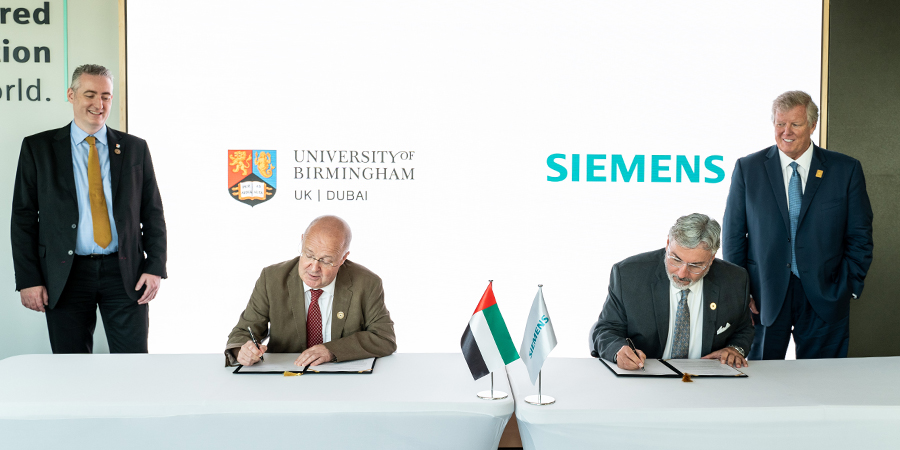The University of Birmingham has selected Siemens to create an intelligent campus app that will help make its Dubai campus one of the smartest and most sustainable environments for higher education in the world.
Under their agreement, Siemens will deploy the customized app to bring the benefits of digitalization to the mobile phones and computers of students, faculty, staff and visitors alike, enhancing their experiences at the University’s new campus in Dubai.
The app represents the first phase of an intelligent campus project, and it broadens the work that Siemens is already doing at the University’s innovative Dubai campus. The company is providing a building management system – the backbone of smart infrastructure that increases comfort, efficiency, resilience and safety – and laboratory controls to maintain air conditioning and temperature requirements, as well as 2,000 Internet of Things (IoT) sensors that adjust lighting based on occupancy and environmental changes. With the app, the University can achieve a higher level of student and staff experience and better collaboration and demonstrate a more efficient use of resources than other campuses.
The intelligent campus app complements the University’s partnership with Siemens to create a smart and sustainable educational institution. The project will show how the Dubai campus can be transformed into one of the world’s most advanced ‘living labs’ through the deployment of a range of digital technologies.
Professor David Sadler, Provost at the University of Birmingham Dubai said, “As a global civic university we have a strong commitment to sustainability and social responsibility. Our partnership with Siemens, both in Dubai and Birmingham, aims to deliver the campus of the future, using cutting edge technologies to make our campuses among the smartest, most intelligent and sustainable globally. This will enhance our student experience, research, education and wider campus community, strengthen our engagement with industry, in addition to significantly reducing our carbon footprint.”
The Dubai campus will open this year, and Siemens expects to complete deployment of the new app in the first half of 2022. In addition to the app, Siemens will deliver an innovation lounge that provides a collaboration and learning area for events, presentations, hackathons or workshops.
“Siemens supports the University of Birmingham’s vision that students are more than just ID numbers and that their quality of life is a critical component of their education experience,” said Franco Atassi, the CEO of Siemens Smart Infrastructure in the Middle East. “We are excited to be working with the University on this project and confident that together we can develop the smart campus in Dubai to not only be energy efficient, sustainable, safe and comfortable for the community, but also a demonstration of how technology can transform such facilities wherever they may be.”
Siemens will integrate the intelligent campus app with its Enlighted IoT sensors to detect space occupancy and utilization and help users navigate the campus. The app will also be linked with the Siemens DesigoCC Building Management System so that users can control their personal environment in certain spaces. The app will enable students and staff to browse for and reserve desks and meeting rooms, request lighting and air conditioning adjustments where they work or study, invite visitors, and find points of interest with turn-by-turn navigation.
The technology solutions implemented at the Dubai campus will support the global cooperation between the University of Birmingham and Siemens to capture data from the University’s building technologies, infrastructure, and energy plants and utilize it for research and development as well as teaching. Monitoring energy demand in real time with live data from across the site provides students with a unique opportunity for applied learning and a platform for cutting-edge research. This holistic approach will allow the University and its partners to test energy innovations and low-carbon solutions at a large scale and optimize energy generation and usage across the campus.









